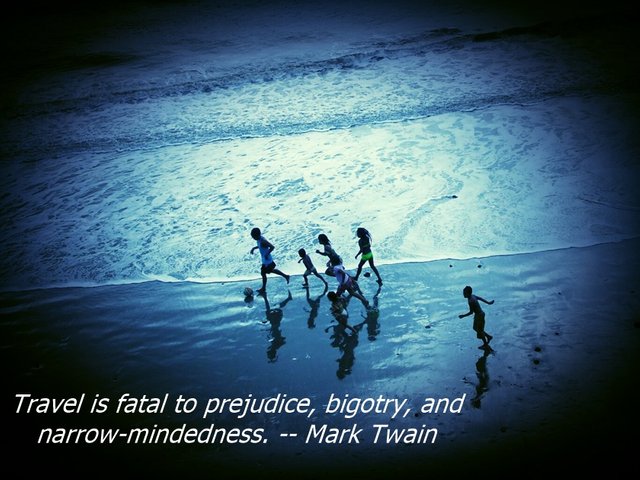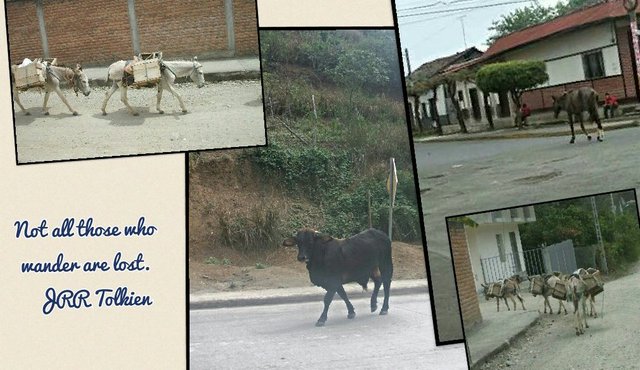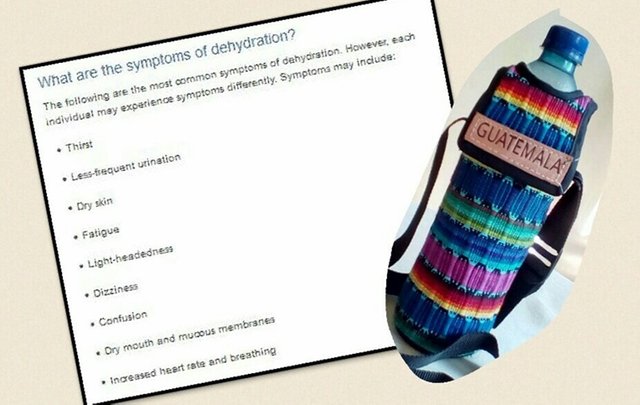Part 2, HALT to Reduce Travel Misadventures
Failure to HALT can get you in trouble abroad. @Steemerpat says: Limit travel mistakes by using the HALT tool.

I learned the HALT acronym from a friend in Alcoholics Anonymous. Since I became an expat six years ago, I began noticing how often my travel mishaps were due to failure to HALT.
AA uses the acronym to remind those in recovery to be vigilant lest they relapse while Hungry, Angry, Lonely, or Tired, but I realized that travelers need some additional HALT words: Hot, Altered, Accustomed, Absorbed, Assuming, Lost, and Thirsty. I learned how these physical and emotional vulnerabilities wreak havoc from the best teacher: experience.
Quick: which HALT conditions led to the problems of a certain Olympic swimmer?
Being in one of these vulnerable states captured by the HALT acronym can cause us problems while we’re traveling even if our name isn’t Ryan Lochte, but applying self-care and taking reasonable precautions at the right time can minimize problems and optimize our adventures.

In Part 1, I described this concept more fully and discussed the H and A words. Part 2, a shorter blog, focuses on the L and T words--lonely, lost, tired, and thirsty.
Part 3 will apply the HALT concept to examples I experienced or heard about from friends while living in four foreign countries. For an overview of my life as an expat, see my introductory blog.
Lonely
Loneliness can make you:
• Relapse if you’re in recovery
• Eat, drink, or use other substances or activities excessively
• Trust people you’ve just met
• Enter quickly into ill-advised sexual or romantic liaisons
• Commit suicide.
Use your existing support system as you develop a new one. Join expat groups on social media. Have a plan for dealing with boredom. It’s fine to develop fast friendships—that’s how it often happens—but go slowly in risking your safety and possessions. Keep in mind that in impoverished places, marrying a foreigner is a route to prosperity; even if you consider yourself poor, you’re rich in a country where wages may be just a few dollars a day.
Check out gringo hangouts, but realize that heavy drinkers and malcontents sometimes dominate at bars. For alternatives, consider meeting people by volunteering, taking classes, acquiring new skills, or developing new hobbies. Read books or watch movies that provide solace, humor, and inspiration.
Realize that even if you have your partner or family with you, you still may feel lonely for extended family and friends or for familiar places and routines. Be grateful you are alive in the age of Skype and recognize that adjusting to such a vast change takes time.
Lost

When you become lost, you may:
• Panic because you feel vulnerable, especially if it’s late and you’ve wandered away from safe areas
• Make bad choices
• Make it easier for someone to victimize you.
Smart phones with GPS can help you find your destinations, but you may not have a smart phone with you, it may not work, or the mapping might not be accurate. Street and house signage is spotty in many places, and counting streets helps only if you know where extra street names are inserted (i.e., 26A).
All of the other HALT conditions can make it harder to cope with being lost, especially Altered and Absorbed. Pay attention.
Take deep breaths and call on your coping skills. Assess the risk. If you’re in a busy neighborhood with businesses open, maybe it’s time to rest with a cold drink while you regroup. Locals are often helpful if you can ask (and understand the answer), but, to save face, some people will point in a random direction while not having a clue.
If you’re walking, can you get a taxi? If you’re driving, can you pull over, relax for a moment, and figure out where you are? Remember, you’re still on the planet, so that’s a start.
To reduce the chances of becoming lost, study your map ahead of time to get a picture in your head of the streets. Find out how legitimate taxis look. If your phone doesn’t work in your new location, consider getting a cheap in-country phone or chip with prepaid minutes. Ask your hotel or hostel for the number of a reliable taxi service.
Not being able to find a particular destination is not the only way you can become lost. You may feel the loss of everything that was once familiar (see also Lonely). The climate’s different, the food’s different, and the language or accents are different. How do you find your place in a new country, and how do you cope while you adjust? The tips under Lonely can help you with this kind of loss as well.
Tired
If an exhausted driver can be as dangerous as a drunk one, imagine what trouble fatigue can get you into when you’re abroad. Because of tiredness, you may:
• Accept incorrect change, an inaccurate bill, or a bad deal
• Make errors in calculating exchange rates and tips
• Forget all those foreign words you spent months learning
• Lose stuff or have stuff stolen
• Miss your bus or train stop
• Tip over into anger when frustrated
• Make hasty decisions
• Accept ‘help’ from the wrong person
To minimize the effects of tiredness—and for lots of other reasons—avoid late evening arrivals whenever possible. Arrange onward transportation in advance or find out how to access safe transportation when you arrive.
Limit how far you have to travel once your flight lands. If that means staying in a large city, check for travel warnings regarding taxi scams and unsafe areas.
Don’t push yourself too much until you’ve had a chance to recover from travel. Drink lots of water and eat healthy food. If you feel frazzled, go back to your lodgings to rest.
The tiredness from long flights and jet lag may be floating on top of the fatigue of your frantic departure from your own country. For expats, the last days before an international move are generally horrible.
Once you arrive, move slowly. If you need to find permanent housing, try to budget for extra days in temporary lodgings. Alternating your house search with rest and recreation can prevent expensive mistakes that result from hasty decisions.
Thirsty

Being dehydrated can:
• Contribute to heat-related problems (see Hot, Part 1)
• Cause an increased heart rate and other problems
• Be fatal if severe.
If you on a second-class bus, a small boat, or a bumpy flight where you’re confined to your seat, you may need to limit your fluid intake drastically, especially if you have bladder issues due to an enlarged prostate, a pregnancy, medication side effects, or illness. Make sure you have gaps where you can drink lots of water with a bathroom handy, especially after flying.
Take water with you on walking excursions; if you don’t carry a daypack, use a holster with straps or another hands-free way to carry a water bottle. Otherwise, you may set it down somewhere and forget it.
Don’t let yourself get so thirsty that you drink unsafe water. Realize that beer and soda are poor substitutes for water. If you are ill with vomiting or diarrhea (or exercising heavily in hot weather), use a fluid replacement.
Applying HALT techniques can make travel less fraught with disasters, but it can’t prevent every problem. Some (not all) of the difficulties we encounter and intelligently overcome will become fond memories as well as our best learning experiences … not to mention fodder for hilarious anecdotes when we’re (safely) back home. Experience is the best teacher.
In Part 3, I’ll tell you some of the mishaps that taught me to apply HALT—although class is still in session.
Follow me on Twitter. Words, photos, and montages by Pat Bray, editing by Bob Bray.
GREAT article! Both fun and really informative, liked it. :)
I would like to include it in my TOP5 Lucky Find Psychology articles for today! :)
Thank you for the additional exposure. I appreciate it. I've followed you, and I'll check out the other posts you've featured as well later today.
Here is a post where I'm featuring your article:
https://steemit.com/psychology/@aleksandraz/daily-psychology-it-s-a-lucky-find-8-today-s-top-5
This post has been linked to from another place on Steem.
About linkback_bot